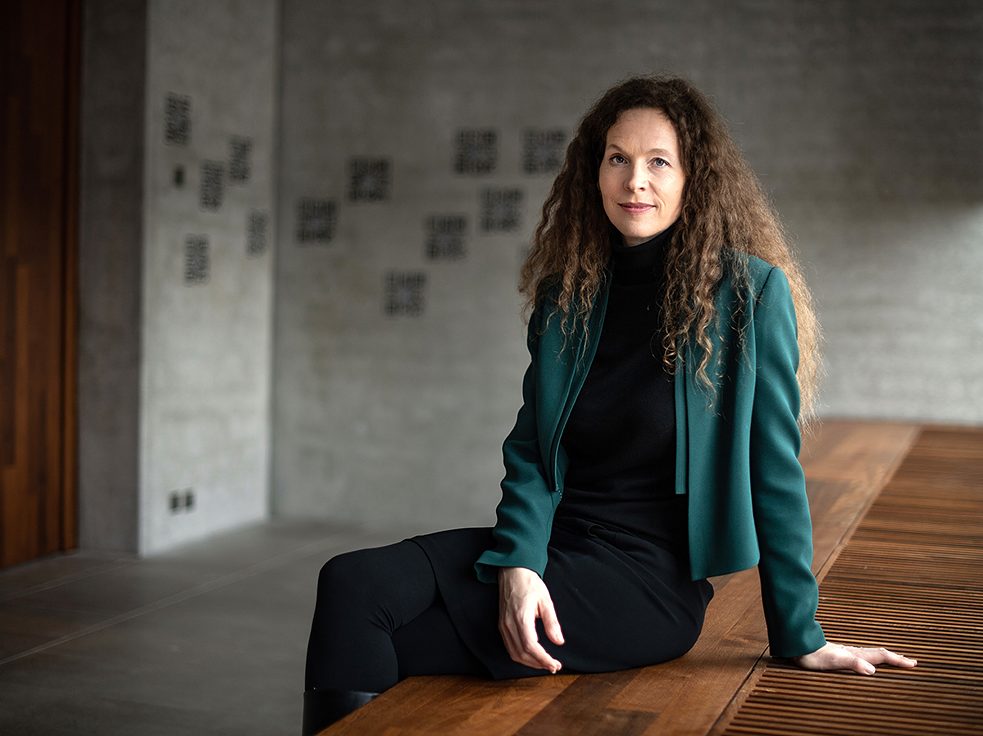Deutsches Literaturarchiv Marbach
“Promoting literature research via the archives”

What does the literature archive of the future look like? If the director of the largest and most important German literature archive, Sandra Richter, has anything to do with it, the German Literature Archive in Marbach is going to become more digital – providing ever new possibilities for literary research.
The German Literature Archive (Deutsches Literturarchiv/DLA) in Marbach is something like a memory bank for modern German literature and is considered to be the most important and largest archive in this field. It houses the legacies of writers such as Kafka, Schiller or Tucholsky. The literature professor and director of the DLA, Sandra Richter, now wants to tackle the mammoth task of digitising the inventories of the DLA – and thus provide new momentum for literature research.
Frau Richter, at some point in the course of their studies, almost every student of German literature comes into contact with the DLA in Marbach. You are a graduate of German literature and you now teach and do research as a professor of literature in Stuttgart. Can you still remember your first visit to the DLA?
Oh yes, I felt like a bull in a china shop back then.
How come?
I was doing research on a writer and philosopher of the 19th century, Friedrich Theodor Vischer. His estate is stored in Marbach and I wanted to delve into it - and into as much of it as possible. I had after all taken several days off for it, but all I was allowed to see was a mere ten papers from the stocks – access to material was limited in those days. My first reaction was one of shock. Later, a new supervisor came on shift and thankfully a lot of green archive boxes were placed on my desk. Nevertheless, it was later pointed out to me that that was very unusual. I was embarrassed, I had the feeling that I could never go back there again.
Things, however, turned out differently - you were involved with the archive for years, among other things, via cooperation projects between the University of Stuttgart and the DLA - such as the Suhrkamp-Forschungskolleg (Suhrkamp Research College) and the Marbacher Sommerschule (Marbach Summer School) – but also as a member of the History of German Studies research group and as a member of the Academic Advisory Board of the DLA. You have been in charge of the archive since the beginning of this year. Did you sometimes ever think during all those years – if I were head of the institute, I would change one thing or the other?
No, that was never an issue for me. It never crossed my mind whether I would one day want to be the boss at Marbach. The whole thing came about at very short notice. I was called and asked whether I was interested just before the post was advertised. Only then did I start to think about what a literary archive of the future should look like, about how I could develop it for its users, its visitors, and which topics could be given more space than before.
 The director of the German Literature Archive in Marbach, Sandra Richter.
| Photo: © picture alliance/Fabian Sommer/dpa
What results have you come up with and what are your plans?
The director of the German Literature Archive in Marbach, Sandra Richter.
| Photo: © picture alliance/Fabian Sommer/dpa
What results have you come up with and what are your plans?
One of my main goals is the digitisation of the inventories, but also to adopt a stronger digital approach. From my point of view, these are two different things: the former is about storing the text, i.e. to digitally secure what we used to store on microfiche. The other is working academically with the digitised materials.
Could you explain that in more detail?
The aim of digitising material is not just to store data. There is so much more you can do with it. For example, digitised materials can be organised in such a way that they can be researched quantitatively by machines – focussing on terms or text structures of all kinds. Moreover, they can also be combined with other texts. In this way you can build a platform, bring in different texts and discover things that were not seen before or seen only with great effort. How often Faust appears in Faust, for example, can now be easily ascertained. Or you can also find out about which specific transverse structure Schiller uses in his dramas. The catalogues can also be increasingly networked, potentially enhanced with research data, linked to other sources and referenced. In the future, it will also be possible to digitally link individually scattered, literary estates, such as those of Kafka. In addition, we want to pay more attention to born-digital materials, i.e. to the archiving of texts that were not originally written by hand, but on the computer. The fact is that the computer is more than just an aid. It is a supportive device that allows questions to be developed, questions to be phrased more precisely, and questions to be answered more precisely.
Will these new approaches change literary research?
Absolutely! Both aspects, digitisation as well as working with the results, move the areas of research and development much more closely together than before. In the past, a librarian or archivist had to try to describe, record, categorize a text, say where it came from and how it came about. Now the transition to research is much more seamless. I find that very appealing, because with the help of the archives we can promote research and teaching in a much stronger way and offer users even greater added value.
But surely you do not handle all these projects alone ...
No, I have found a few partners, esteemed colleagues, with whom I have been working together for some time. These include computational linguists with whom I am currently involved in a project called Center for Reflected Text Analytics, Creta for short. With these specialists and a few others, I have been working on how we can exploit deep text analysis approaches in Marbach. Another cooperation project is focussed on empirical psychology - we would like to observe visitors reading digitized material and dealing with texts of various kinds. This is all happening under the auspices of the newly founded Netzwerk für literarische Erfahrung (Network for Literary Experience) - together with the Leibniz Institute for Knowledge Media in Tübingen and the Max Planck Institute for Empirical Aesthetics in Frankfurt.
Do you think the DLA is well prepared for digitisation?
The archive will, in fact, soon be full and that is why it is in dire need of restructuring. In the wake of digitisation, we need rooms for the servers, for the digitisation equipment, for multimedia workstations and the seminar rooms will have to be adequately equipped. If we do not create any structures here, for example, by adding a new building, Marbach will no longer be able to continue to collect materials and grow in the foreseeable future. That’s why I’m travelling around so much at the moment, trying to promote further investment.
How optimistic are you?
The general public is aware of how important the DLA is and the work done by my predecessors contributed a great deal to this. It is clear to most cultural policy makers that digitisation of the archives is changing so much and that Marbach, in its function as the main port of call when researching literature and important literary sources, still plays and must continue to play a pioneering role in this regard. We are faced with a challenge – one that has to be mastered. Because - if we do not take it on, who will?